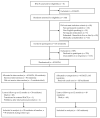Impact of Medication Regimen Simplification on Medication Incidents in Residential Aged Care: SIMPLER Randomized Controlled Trial
- PMID: 33800845
- PMCID: PMC7961370
- DOI: 10.3390/jcm10051104
Impact of Medication Regimen Simplification on Medication Incidents in Residential Aged Care: SIMPLER Randomized Controlled Trial
Abstract
In the SImplification of Medications Prescribed to Long-tErm care Residents (SIMPLER) cluster-randomized controlled trial, we investigated the impact of a structured medication regimen simplification intervention on medication incidents in residential aged care facilities (RACFs) over a 12-month follow-up. A clinical pharmacist applied the validated 5-step Medication Regimen Simplification Guide for Residential Aged CarE (MRS GRACE) for 96 of the 99 participating residents in the four intervention RACFs. The 143 participating residents in the comparison RACFs received usual care. Over 12 months, medication incident rates were 95 and 66 per 100 resident-years in the intervention and comparison groups, respectively (adjusted incident rate ratio (IRR) 1.13; 95% confidence interval (CI) 0.53-2.38). The 12-month pre/post incident rate almost halved among participants in the intervention group (adjusted IRR 0.56; 95%CI 0.38-0.80). A significant reduction in 12-month pre/post incident rate was also observed in the comparison group (adjusted IRR 0.67, 95%CI 0.50-0.90). Medication incidents over 12 months were often minor in severity. Declines in 12-month pre/post incident rates were observed in both study arms; however, rates were not significantly different among residents who received and did not receive a one-off structured medication regimen simplification intervention.
Keywords: long-term care; medication administration errors; medication incidents; medication regimen simplification; nursing homes; residential aged care.
Conflict of interest statement
J.K.S. is supported by an NHMRC Early Career Fellowship. J.S.B. is supported by a Boosting Dementia Research Fellowship. E.Y.C. was supported by a postgraduate research scholarship funded by the NHMRC, CDPC and the Monash University Faculty of Pharmacy and Pharmaceutical Sciences. R.E.H. is supported by a postgraduate research scholarship funded by the NHMRC and the University of New South Wales National Drug and Alcohol Research Centre. N.D. was supported by strategic funding from the Faculty of Pharmacy, Université de Montréal, Montréal, Québec, Canada. M.C., J.V.E. and M.H. were employed by the aged care provider organization participating in the SIMPLER study. There are no other conflicts of interest to declare.
Figures



References
-
- Aitken M., Gorokhovich L. Advancing the responsible use of medicines: Applying levers for change. SSRN Electron. J. :2012. doi: 10.2139/ssrn.2222541. - DOI
-
- World Health Organization . Medication without Harm- Global Patient Safety Challenge on Medication Safety. WHO; Geneva, Switzerland: 2017.
-
- Pharmaceutical Society of Australia PSA19: Minister Hunt Reaffirms Commitment to Addressing Medicine Safety. [(accessed on 30 August 2020)]; Available online: https://www.psa.org.au/psa19-minister-hunt-reaffirms-commitment-to-addre...
-
- National Coordinating Council for Medication Error Reporting and Prevention about Medication Errors. [(accessed on 30 August 2020)]; Available online: https://www.nccmerp.org/about-medication-errors.
-
- Stowasser D.A., Allinson Y.M., O’Leary K.M. Understanding the medicines management pathway. J. Pharm. Pract. Res. 2004;34:293–296. doi: 10.1002/jppr2004344293. - DOI
Grants and funding
LinkOut - more resources
Full Text Sources
Other Literature Sources

